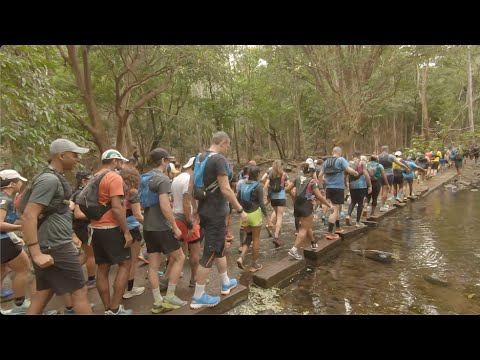The Beer Factory: How ALMAZA is Produced Since 1931. Lebanon's Favorite Beer to the World

Welcome Anthony to Almaza Brewery. I am with you Naji Nakozi, General Manager of Almaza. Welcome.
As you know, Almaza was founded in 1933 and it lived all the Lebanese history, from 1933 till today. The brewery, there was an acquisition lately from Mr. Philippe Jaber, our new chairman, which is now owning a majority of Almaza's shares. Heineken is our partner, they kept a small minority shares. We are also the distributor of Heineken in Lebanon. We produce Almaza, Laziza, and Rex, and we also distribute Heineken brand in Lebanon.
What distinguishes Almaza Beer from others is that the recipe of Almaza is made to match the Lebanese Almaza, which is one of the top cuisines in the world as you know. So it's accessible, friendly, just like the brand's personality. And where there is a Lebanese diaspora, there is Almaza. So it's available everywhere as export markets, from Australia to Brazil, Europe, America. So you will be able to find Almaza.
Look at this, it's coming just right. Just like you said. Perfect. Roll it. It looks like a dessert. I've been waiting for this moment for a long time.
I've been waiting for this moment to see and enter Almaza's factory and show you Almaza. I've been waiting for this moment for a long time. This factory which has been here for almost 100 years.
The pride of the Lebanese industry. The Lebanese beer which every Lebanese person or Arab knows hears in Almaza. And I can't wait. I can't express my feeling. Let's go to the factory and start. Good morning. Hi Anthony.
Good to see you. We know you very well from everything you are presenting in all your shows. And we like to be with you here. Thank you. Welcome. I am Fadi Hjaili.
I am the brewing and quality manager. I've been in Almaza for 24 years. Long experience. And at the same time, I am the master brewer of this company. Heineken Master Brewer. Mario is my colleague.
He will join us also in this round. So I am here, as I told you, I am the master brewer of Almaza. So I make the recipe. I invent the new things.
I preserve the old things and make them more optimized. So we mix the ingredients here. We make the recipe. We go through the process. We monitor the temperature, the pressure.
All the process from A to Z. Until the beer becomes a final product as a beer. Of course, in the quality department, we monitor everything. Analysis, microbial, physical, chemical, sensorial. So we have a lot of analysis.
You will see the lab in a bit. We will start with the brewing process. How do we collect these materials? What machines do we use? We start with the milling. This is the mill. Here, we mill the barley. Because the barley comes whole grains.
We grind it with the mill and put it in this tank. Then, the whole grains come with the mill. We collect them together in these two machines.
The second machine starts with the sugarification process. Sugarification means the transformation of the grains' starches to a sugar that is able to be fermented. As I told you, we use grains in our mixture. Of course, in a small quantity.
This mixture started in 1933 with Amstel. Amstel was the leader of beer at that time. We followed their recipe because it gives us better taste and more drinkability.
The consumer will be satisfied with a better, easier, and tastier food. I want to tell you how happy I am. We pass by this road everyday. Everyday, everyday, we pass by this road.
Where are we? At the Doura highway, in one of the oldest and greatest factories. In a location that no one would have thought that there is a factory here. But we pass by this road everyday and look and see these.
These. We all see them. You are seeing them everyday on the Doura highway. What do they do? How do they work? These are what make you. The beer that each of you drinks. I will say everyday, but at least once a week.
The Lebanese gold. We mix the water, barley, and corn to start with the sugarification process which is the transformation of the starches to the sugar that is fermented. This happens in this cell. If we look here, the barley juice is mixed together and the sugarification process happens in this cell. Then, this juice that we have here, we need to filter it. We need to remove the barley husk from it.
We filter it with the L'eau d'Ordon filter. The barley husk, which is the child, we sell it to the farms as a can. We don't throw it to pollute the environment.
This is a very good thing. By the way, we will talk about many things for the environment. One of them is this. We benefit from it and we don't pollute the environment. After we filter this juice, we sell the child and take it to the second place.
Then, we boil it. Like any other dish, we call this brushing. We are cooking. We collect these materials and cook them. At the end of cooking, we boil them. Here, we boil this mixture that we have.
We boil it until the dish becomes more complicated and we get a barley juice that is ready to be fermented. It is very important to know that this process is fully automated. It is a new brand, fully automated. It is a German factory.
As we saw, the automation, the operator controls the whole process. There are many parameters. All these parameters are parameters. It is a fully automated system. The operator has to follow the computer and the computer has to follow the process. Hi Anthony, I am Mario Nasser, I am an engineering and packaging manager in Almaza.
I will give you a brief about the solar project that we are doing. And the environmental policy that we have in Almaza. Here, we are seeing the solar system.
It is about 900 panels. Each panel is 555 watts. In total, we are securing 500 kilowatts. 500 kilowatts peak. It is an on-grid system that supports our generators and power supply system in the factory.
We are talking about cost saving for around 150,000 dollars per year. In addition to everything, it benefits CO2 emissions and environmental impact. Again, again, again. I am very happy.
Not only in the heart of Almaza factory, but on the roof of Almaza. To show you this building that has been in front of us for more than 40 years. I said that I will enter inside one day. And the time has come.
But we are here to show you the solar panels. To show you how beautiful the work is. How much diesel will be stopped. How much pollution will be stopped. And how much they covered each ceiling.
So that all the production happens. 100% natural. 100% from the sun. Wow. This is a beautiful work. All Lebanese factories should be like this.
All Lebanese buildings should be like this. All Lebanese houses should be like this. All motorbikes should be like this. This is also a part of the safety culture that we have in the factory.
We put a lot of importance on how frequently we have accidents. We monitor this issue. For all people to be aware, to behave safely in the factory. We are now in the lab. This is the chemical lab. Of course, we should check everything that we use and buy in the factory.
From the copper, the copper, the nylon, the cardboard, the bottle. This lab should check everything from A to Z. Also, any process during production.
Also, this lab should take samples from every tank that we make. From every tank to check the things that are in it. What happens here? Do you do tests? Here, we do the sensorial analysis. We should taste every tank that we make.
We have a tasting committee here in the factory. It is trained and we do a training every time. It should be smelled and tasted. We do every batch and record it on the computer. We get graphs to see how stable we are and how much we can improve further. You are now in the export department, business development.
I am the representative of this department since 2016. We are handling everything related to operations outside of Lebanon. Everything related to export, we do it.
Everything related to approach with new markets, we do it. Everything related to development or any opportunity that we can find that is suitable for the company, we are doing it. We are present in about 34 countries directly.
Indirectly, we are present in more than 45 countries. Sales, we are doing good especially after the inflation that happened in Lebanon. Our main focus is on the export.
We have a plan for the coming 5 years. So we hope the best for the company and for us as a department. Our first export started in 1986. It was in USA. After that, we started to enter from country to country. We are also in Bose Items, which are the diamonds, which are alcohol, and the delicious ones, which are also without alcohol.
We are in almost all the countries, which are the Gulf, which are in Australia, America, and almost all the continents. So we can reach anyone, any ethnic, any flavors, anyone who likes it, which are in Laziza. And any beer, also genuine, we are in it as a listener, which are the diamonds. The first step of the project On the way, we see these things. This is the first stage, which we were in at the beginning, which is cooking.
But in 1933. Now, we are leaving them as a museum. We will make gatherings around them, tasting, gathering.
It will be something that we are proud of. Now you will know, when you pass by the highway, what are these. How old are they, if they are used or not. All of these are not used anymore, they are national museums.
I hope that tomorrow, they will be fixed and improved. They will be open for all of you to come and see. Your beer, how it is made, how it was made, and we celebrate together 100 years of beer in Lebanon, very soon. Something amazing. The development is still continuing, and the taste hasn't changed. Even if the machines, digital, and computers entered.
They are still here, and they reminded me of the Heineken Museum, the Guinness Museum, and all of the museums in the world, which are opened for people to come and enter and make a connection with emotional products. Like the diamond and others, which is more than just a beer. It is something that speaks our language. In the world, where there is a Lebanese, there is a bottle of diamond with it. Green light, safe to go.
If there is any problem, high sound, CO2, red light, alone, this way is safe for all employees. Nothing should happen to them. We reached the fermentation area. The juice that we made down there, which we showed you a while ago, we bring it to these tanks. Here, we have very big cylinders.
Each one is 800 hecto. We have a very large number to cover the Lebanese market. The juice comes from down there, we put yeast. The yeast that we have since 1933, we preserve it as it is because it is one of the secrets of the taste of the diamond beer.
We start the fermentation. The fermentation takes 14 days. During these 14 days, all the sugars that we got from the barley and corn are converted to alcohol plus CO2. Here, we took a derivative from each fermenter to be able to do a visual check to know if this fermentation is going in a natural way or not. What is happening here is happening in the fermentation.
These, you saw them down there, are this big. The fermentation of the barley and corn is done in a special way. It is very important to know that the fermentation is fully automated. We don't have many designers.
You find someone who is following the computer. The factory, as we said, is down there. The machines are from Germany. Kronos Steinegger.
I am walking and learning. I didn't have many answers to many questions. Why is it delicious? How is the same taste after more than 70 or 80 years? What are they doing? How many people work in the factory? It is automated, new, and renewed. There are many questions that we are answering. We were walking in front and seeing stainless steel.
We see the copper pick. These are the distillers. Now, we understood that there is work, security measures, professionalism, and international standards in a factory here, made in Lebanon. This is the last stage of brewing.
Now, we will filter the beer that we brewed there and opened earlier, so that we can separate the yeast from the beer. They look like Farsi today. Where are the designers? As I told you, everything is fully automated. There are not many designers. 2 or 3 do all the work.
What is the equipment? Anthony, these are PPEs. Now, we are entering the packaging line. It is a necessity for us. We saw a very nice process. It is automated. There are not many designers.
When someone is working inside, this bottle is used to be used at the end. It is either a diamond or a diamond. What did we see inside from the beginning to the end? Anthony, what you saw is the packaging line where we fill the beer. It is in bottles or cans. We either fill the bottle or fill the can.
As I said, it is a fully automated system. There are brand new machines inside. Of course, we monitor everything with performance indicators to have the most efficient productivity. Currently, as I said, we are filling the Lazija.
We have production today. We produce around 226,000 bottles per day. In the can, we are talking about 140,000 bottles per day. This is seasonality.
In summer, the production increases more. We have 24 hours and we increase productivity. What we saw today is that the bottle that comes from outside is cleaned and sanitized.
It is checked with a laser. Then, it is put in the machine and cleaned, filled, and closed. It is pasteurized. This is a very important thing to last for a year or so. Then, this delicious thing is produced. This is before pasteurization.
It is behaved by chemicals before thanks to the cool temperature. How delicious it is, and the best fresh bone. This is a chance that not many people have to try it. Cheers! The smell of peach is following us from side to side. Look at the surface. 360 0:20:20,000 --> 0:20:02,880 It's super super tasty. Without alcohol, 140 calories, very refreshing.
Cheers to me. We know that we have 2 products. We have beer and barley wine.
Barley wine is the delicious one. Barley wine doesn't pass the fermentation stage. Therefore, it remains a wine. That's why we write on the bottle, barley wine without alcohol. It's very important to know this point.
This wine is 0.00% alcohol. It doesn't pass the fermentation stage. Our tour ends here. I want to tell you that I really like what I've done. I've been wanting to come here for a long time. The shop is fresh, it's not on the shelf.
It's a daily production, it's been a week. You can buy beer and take it home. I'm very happy today. Guys, thank you so much. Cheers! Thank you for your help. Cheers to you, to Lebanon, to this week.
And to the past. We're drinking after work. Yes, we're drinking after work. The logo is over, the video is over, the music is gone.
After work. Yes, they don't drink here while they work.
2023-06-01 19:09


